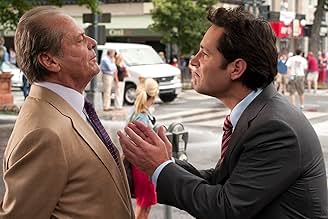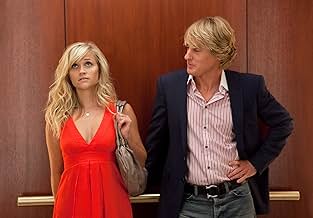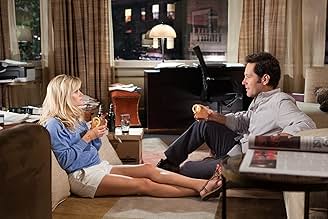PUNTUACIÓN EN IMDb
5,4/10
56 mil
TU PUNTUACIÓN
Tras ser excluida del equipo de sóftbol de Estados Unidos, Lisa se encuentra valorando su vida y en medio de un triángulo amoroso, mientras un hombre de negocios en crisis compite con su act... Leer todoTras ser excluida del equipo de sóftbol de Estados Unidos, Lisa se encuentra valorando su vida y en medio de un triángulo amoroso, mientras un hombre de negocios en crisis compite con su actual novio jugador de béisbol.Tras ser excluida del equipo de sóftbol de Estados Unidos, Lisa se encuentra valorando su vida y en medio de un triángulo amoroso, mientras un hombre de negocios en crisis compite con su actual novio jugador de béisbol.
- Premios
- 3 nominaciones en total
Argumento
¿Sabías que...?
- CuriosidadesOne of the lesser known "big box-office bombs of all time"; the budget spiraled up to $120 million due to high salary demands of its principal cast and director (around $50 million), a lengthy production, as well as a costly re-shoot for the beginning and the ending. Coupled with marketing costs, the movie lost an estimated $105 million.
- PifiasAfter their first night together, Lisa is seen wearing a red camisole that has straps showing after putting on her red dress from the night before. The straps didn't show during their date and after she got home.
- ConexionesFeatured in The Tonight Show with Jay Leno: Episodio #19.58 (2010)
- Banda sonoraWhat Is It This Time?
Written by Jamie Lidell (as Jamie Lidderdale) and Mocky (as Dominic Salole)
Performed by Jamie Lidell
Courtesy of Warp Records
By Arrangement with Zync Music
Reseña destacada
Some filmmakers you just fall into. The ones I hold most dear are those that are both expert cinematic storytellers and attempt to reshape me. These are rare, but there is a second tier of cinematic storytellers; although they do not work at deep levels, you just get captured by the mastery of the storytelling. Brooks is one of these. He is a master and even his disaster in 1994 was interesting.
This film did poorly in the US. I think it was not zany enough, short enough or abstracted from reality enough for the audience who is attracted to the form. Perhaps if it is judged as mere candy, it fails. But I found it well met the requirements on which the genre was founded: the alternating of charm in the nature of humans with humor about many of the same traits. This engagement-detachment by humor is perhaps the oldest storytelling device after the technique of omission, and Brooks is delicate if old-fashioned.
The story is that he is valued in the business for adding texture of these two qualities: humor and endearment. But he gets stuck in creating scenes that are no longer than a few minutes, because that is what the market pulls. He gets paid extremely well for guiding "The Simpsons," basically two jokes per show, and also as uncredited script doctor on a scene by scene basis. He hates this, he has said and when he can find the space for a long form project, he does it as if his soul is in the balance.
He doesn't start with characters weaving a story, or even a story proper. He is all about situations and how people react within them as they try to gain control. Our two main characters here, destined for love, are struggling less with the lives they are given than the techniques they had been using until that point to cope. The weapons in forming the new situations we desire then to get, are words. And such words in dialog that is so perfect we don't deserve the simply by paying 8 bucks.
Brooks is a writer, but it is clear that every line is written within a specific cinematic vision. Some of the shots here are quite unconventional, the composition and rhythm of shots is very personal and the flow of the words absolutely matches or is counterpointed to that rhythm. Watch the motions of the camera and the dialog when Lisa is first in George's apartment. This is effective and idiosyncratic to Brooks. It worked for me because these films are all about deferred gratification and he is serious about pushing it.
In little things, it works. Witherspoon's lack of sex appeal is handled by making her a tough jock. The formula demands — absolutely demands — that the guy profess his love at the end in front of an audience representing us. We know he is going to her birthday party to do just this, but he does not. Instead Brooks has placed a clever scene before this, a radically unconventional one that works when paired with what happens after the party, observed by no one but us and Nicholsen's character. In this scene — possibly the first written — has the two to-be lovers filming an awkward proposal, and then engaging in a re-enactment in a folded engagement. It satisfies the formula without following it.
There are several folds along these lines, highly structured and effective.
Ted's Evaluation -- 3 of 3: Worth watching.
This film did poorly in the US. I think it was not zany enough, short enough or abstracted from reality enough for the audience who is attracted to the form. Perhaps if it is judged as mere candy, it fails. But I found it well met the requirements on which the genre was founded: the alternating of charm in the nature of humans with humor about many of the same traits. This engagement-detachment by humor is perhaps the oldest storytelling device after the technique of omission, and Brooks is delicate if old-fashioned.
The story is that he is valued in the business for adding texture of these two qualities: humor and endearment. But he gets stuck in creating scenes that are no longer than a few minutes, because that is what the market pulls. He gets paid extremely well for guiding "The Simpsons," basically two jokes per show, and also as uncredited script doctor on a scene by scene basis. He hates this, he has said and when he can find the space for a long form project, he does it as if his soul is in the balance.
He doesn't start with characters weaving a story, or even a story proper. He is all about situations and how people react within them as they try to gain control. Our two main characters here, destined for love, are struggling less with the lives they are given than the techniques they had been using until that point to cope. The weapons in forming the new situations we desire then to get, are words. And such words in dialog that is so perfect we don't deserve the simply by paying 8 bucks.
Brooks is a writer, but it is clear that every line is written within a specific cinematic vision. Some of the shots here are quite unconventional, the composition and rhythm of shots is very personal and the flow of the words absolutely matches or is counterpointed to that rhythm. Watch the motions of the camera and the dialog when Lisa is first in George's apartment. This is effective and idiosyncratic to Brooks. It worked for me because these films are all about deferred gratification and he is serious about pushing it.
In little things, it works. Witherspoon's lack of sex appeal is handled by making her a tough jock. The formula demands — absolutely demands — that the guy profess his love at the end in front of an audience representing us. We know he is going to her birthday party to do just this, but he does not. Instead Brooks has placed a clever scene before this, a radically unconventional one that works when paired with what happens after the party, observed by no one but us and Nicholsen's character. In this scene — possibly the first written — has the two to-be lovers filming an awkward proposal, and then engaging in a re-enactment in a folded engagement. It satisfies the formula without following it.
There are several folds along these lines, highly structured and effective.
Ted's Evaluation -- 3 of 3: Worth watching.
- tedg
- 1 feb 2011
- Enlace permanente
Selecciones populares
Inicia sesión para calificar y añadir a tu lista para recibir recomendaciones personalizadas
- How long is How Do You Know?Con tecnología de Alexa
Detalles
- Fecha de lanzamiento
- País de origen
- Sitio oficial
- Idioma
- Títulos en diferentes países
- How Do You Know
- Localizaciones del rodaje
- Empresas productoras
- Ver más compañías en los créditos en IMDbPro
Taquilla
- Presupuesto
- 120.000.000 US$ (estimación)
- Recaudación en Estados Unidos y Canadá
- 30.212.620 US$
- Fin de semana de estreno en EE. UU. y Canadá
- 7.484.696 US$
- 19 dic 2010
- Recaudación en todo el mundo
- 48.668.907 US$
- Duración2 horas 1 minuto
- Color
- Mezcla de sonido
- Relación de aspecto
- 1.85 : 1
Contribuir a esta página
Sugerir un cambio o añadir el contenido que falta

Principal laguna de datos
What is the Japanese language plot outline for ¿Cómo sabes si...? (2010)?
Responde









































